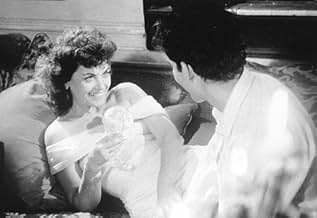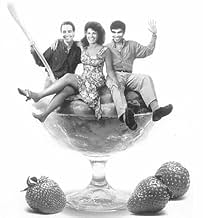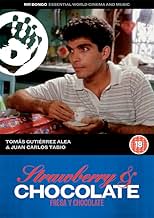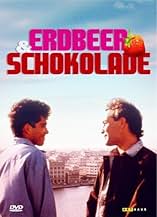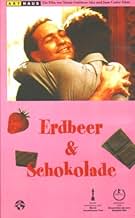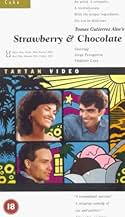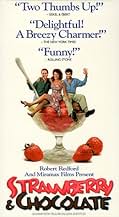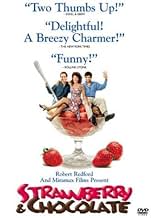CALIFICACIÓN DE IMDb
7.4/10
6.2 k
TU CALIFICACIÓN
La historia de dos hombres que son completos opuestos: uno gay, el otro hetero; uno comunista, el otro individualista; uno desconfiado, el otro confiado; y de como llegan a quererse.La historia de dos hombres que son completos opuestos: uno gay, el otro hetero; uno comunista, el otro individualista; uno desconfiado, el otro confiado; y de como llegan a quererse.La historia de dos hombres que son completos opuestos: uno gay, el otro hetero; uno comunista, el otro individualista; uno desconfiado, el otro confiado; y de como llegan a quererse.
- Dirección
- Guionistas
- Elenco
- Nominado a 1 premio Óscar
- 25 premios ganados y 2 nominaciones en total
Opiniones destacadas
A beautiful movie for the heart. One of the most wonderful stories of friendship ever told.
Jorge Perugorría as Diego is amazing. (I'd well like to see some of his other work.) It is most astonishing to see how his character develops from the limp-wristed cliché gay at the beginning to a fascinating man who gets in conflict with the regime because he is different on every level from what the system requires him to be: he is an independent spirit, a person with a genuine love for the arts, for literature, for music, he is disappointed by communist ideals - and he is also gay, by the way.
Vladimir Cruz is also very fine as the young and naive David who discovers things through his friendship with Diego he'd never ever thought of: like discovering the beauty of things, of life, of poetry and music... And also being committed to another person, even though this person may seem very 'different' from oneself at first glance.
The development of David's and Diego's friendship is fascinating (I wouldn't interpret anything more into it, not even in the final scene). This is also a "coming of age" tale, in a way: by his friendship with Diego, David begins to think, develops a maturity of spirit - and is also, at last, able to develop a loving and mature relationship with a woman. It is very sweet when he tells Diego: "No-one will hurt her. She is with me."
A true gem of a film. I recommend it to everyone.
Jorge Perugorría as Diego is amazing. (I'd well like to see some of his other work.) It is most astonishing to see how his character develops from the limp-wristed cliché gay at the beginning to a fascinating man who gets in conflict with the regime because he is different on every level from what the system requires him to be: he is an independent spirit, a person with a genuine love for the arts, for literature, for music, he is disappointed by communist ideals - and he is also gay, by the way.
Vladimir Cruz is also very fine as the young and naive David who discovers things through his friendship with Diego he'd never ever thought of: like discovering the beauty of things, of life, of poetry and music... And also being committed to another person, even though this person may seem very 'different' from oneself at first glance.
The development of David's and Diego's friendship is fascinating (I wouldn't interpret anything more into it, not even in the final scene). This is also a "coming of age" tale, in a way: by his friendship with Diego, David begins to think, develops a maturity of spirit - and is also, at last, able to develop a loving and mature relationship with a woman. It is very sweet when he tells Diego: "No-one will hurt her. She is with me."
A true gem of a film. I recommend it to everyone.
9B24
Any perceptive viewer of this film will recognize quickly what it does and does not represent. We can be easily misled by previews or trailers promising stereotypical characters or cheap thrills, designed only to attract attention. They can be a turn-off as well. In this case I was fortunate enough to get past the marketing and into what turned out to be a truly well-made and fascinating film of extraordinary literary dimensions.
First, it is a profoundly anti-fascist and anti-totalitarian tale. Internal references to famous Cuban writers and musicians frame every scene, while the players entertain us with character sketches involving such mundane things as romantic urges, kitsch as art, and ice cream. The action is fast-paced. One bit resolves itself into another with ease. Musical scoring and editing are appropriate in every way -- always a hallmark of any good film.
But it is great acting and great directing that put this one over the top into Oscar league contention. A true "must-see."
First, it is a profoundly anti-fascist and anti-totalitarian tale. Internal references to famous Cuban writers and musicians frame every scene, while the players entertain us with character sketches involving such mundane things as romantic urges, kitsch as art, and ice cream. The action is fast-paced. One bit resolves itself into another with ease. Musical scoring and editing are appropriate in every way -- always a hallmark of any good film.
But it is great acting and great directing that put this one over the top into Oscar league contention. A true "must-see."
`Strawberry and Chocolate' (1993)is set in contemporary Havana. The luster of that city has dimmed after nearly four decades of Castro's rule. David (Vladimir Cruz), a student and avid Castro supporter, is on the rebound after losing his girlfriend. He had taken her to a cheap hotel to make love, but the place is so shabby it puts her off. Instead, he promises never to touch her until they marry. In the next scene, she marries someone else while David stands sullenly among the well wishers at the registry office. Then he meets Diego (Jorge Perugorría).
Diego, who is flamboyantly gay, parks himself at David's table in an outdoor café to eat a dish of strawberry ice cream. For David, this is suspicious because chocolate is also available. Diego says some people like chocolate, some like strawberry, an innocuous line that gives the movie its title and also hints at the odd couple relationship to follow.
Diego does not disguise his sexual interest in David, but is also interested in giving David an education the regime denies him. The older man is far more cultured than his new friend. Offers of books banned in Castro's Cuba, such as a novel by Mario Vargas Llosa or the poems of John Donne, lure David to his apartment for tea and talk. When David reports that Diego is involved with a forbidden art exhibit, he is directed to befriend Diego to find out more information. `Strawberry and Chocolate' thus sets their emerging friendship against the backdrop of two bleak themes: anti-gay prejudice in the Castro regime, and the betray-thy-neighbor expectation of a police state.
But almost nobody conforms to type. A woman in Diego's building who is part of the neighborhood Vigilance Committee, on the watch for counter-revolutionary activities, turns out to be a good friend to Diego and then to David. Everyone plays one game with the government, but a different one in their private lives. This is a lesson David has to learn. Encounters with women along the way provide a few subplots, but the heart of the story lies in the hearts of the two men.
`Strawberry and Chocolate' is credited to directors Tomás Gutiérrez Alea and Juan Carlos Tabío. The former was, until his death shortly after completing this film, the best known filmmaker in Cuba, winning an international reputation in the 1960's for titles such as `Memoirs of Underdevelopment,' a look at life in Cuba in the early Castro years that tempers criticism with prudence. `Strawberry' is smaller in scale and less overtly political.
The film was nominated for an Oscar in 1995 and won awards at film festivals around the world (including the Sundance Festival). American viewers may instantly slot it with Hollywood features that show how straight characters learn life lessons from a wiser gay companion (`Boys on the Side,' `As Good As It Gets'). And at times Diego's excesses recall the worst performances of Harvey Fierstein. Yet superb performances by the two male leads eventually move beyond stereotypes they and the audience initially share about each other, transforming their unexpected friendship into a statement that puts the lie to official groupthink in a repressive regime.
Diego, who is flamboyantly gay, parks himself at David's table in an outdoor café to eat a dish of strawberry ice cream. For David, this is suspicious because chocolate is also available. Diego says some people like chocolate, some like strawberry, an innocuous line that gives the movie its title and also hints at the odd couple relationship to follow.
Diego does not disguise his sexual interest in David, but is also interested in giving David an education the regime denies him. The older man is far more cultured than his new friend. Offers of books banned in Castro's Cuba, such as a novel by Mario Vargas Llosa or the poems of John Donne, lure David to his apartment for tea and talk. When David reports that Diego is involved with a forbidden art exhibit, he is directed to befriend Diego to find out more information. `Strawberry and Chocolate' thus sets their emerging friendship against the backdrop of two bleak themes: anti-gay prejudice in the Castro regime, and the betray-thy-neighbor expectation of a police state.
But almost nobody conforms to type. A woman in Diego's building who is part of the neighborhood Vigilance Committee, on the watch for counter-revolutionary activities, turns out to be a good friend to Diego and then to David. Everyone plays one game with the government, but a different one in their private lives. This is a lesson David has to learn. Encounters with women along the way provide a few subplots, but the heart of the story lies in the hearts of the two men.
`Strawberry and Chocolate' is credited to directors Tomás Gutiérrez Alea and Juan Carlos Tabío. The former was, until his death shortly after completing this film, the best known filmmaker in Cuba, winning an international reputation in the 1960's for titles such as `Memoirs of Underdevelopment,' a look at life in Cuba in the early Castro years that tempers criticism with prudence. `Strawberry' is smaller in scale and less overtly political.
The film was nominated for an Oscar in 1995 and won awards at film festivals around the world (including the Sundance Festival). American viewers may instantly slot it with Hollywood features that show how straight characters learn life lessons from a wiser gay companion (`Boys on the Side,' `As Good As It Gets'). And at times Diego's excesses recall the worst performances of Harvey Fierstein. Yet superb performances by the two male leads eventually move beyond stereotypes they and the audience initially share about each other, transforming their unexpected friendship into a statement that puts the lie to official groupthink in a repressive regime.
Strawberry and Chocolate -- Wow this was a wonderful surprise and one of the better movies I've seen of late. Set in 90's Havana, this is a very real, believable story of a young homophobes first friendship with a gay man. I found the movie touching and funny and it reminded so much of many men I knew during my years in El Paso.
Diego, played wonderfully by Cuban actor Jorge Perugorria, is very attractive and yet easily the queeniest guy I've seen on film in years. I really enjoyed how comfortable he seemed in the role paying in between the male and female gender roles. This man has a passion for life that he expresses while being outside the mainstream. He does an excellent job of pulling off the crush in a believable way.
He has a horrible crush on David, a young Communist party member who is lured to Diego's apartment with the promise of some photos of Diego took of him while David was acting. No pictures materialized and the two develop a solid, respectful, platonic relationship.
This movie shows that gay and straight men can be friends. It also reminded me of many good times I had by making friends with people I normally wouldn't associate with. Queens are usually not my type...but then again, its a reminder to judge people by the content of their character rather than superficial appearances.
The film also explores Cuban's acceptance of Communism and the country's desire to remain outside the influence of American commercialism. I was very interested to see where Diego's anti-government rhetoric would get him and if the movie would have a moralistic 'gotcha' message at the end.
In reading about this movie it's pleasing to know that the director is a well-known and respected Cuban director (thus making it a bit easier to trust the movie) and the movie was well received in Cuba. Word is it helped to remove the stigma attached to homosexuality in Cuba.
I heartily recommend this film in a way I so rarely do. Easily in the same class as Priscilla for humanity and believability. This one is absolutely worth whatever it takes to find it.
Rating: 9 out of 10.
Diego, played wonderfully by Cuban actor Jorge Perugorria, is very attractive and yet easily the queeniest guy I've seen on film in years. I really enjoyed how comfortable he seemed in the role paying in between the male and female gender roles. This man has a passion for life that he expresses while being outside the mainstream. He does an excellent job of pulling off the crush in a believable way.
He has a horrible crush on David, a young Communist party member who is lured to Diego's apartment with the promise of some photos of Diego took of him while David was acting. No pictures materialized and the two develop a solid, respectful, platonic relationship.
This movie shows that gay and straight men can be friends. It also reminded me of many good times I had by making friends with people I normally wouldn't associate with. Queens are usually not my type...but then again, its a reminder to judge people by the content of their character rather than superficial appearances.
The film also explores Cuban's acceptance of Communism and the country's desire to remain outside the influence of American commercialism. I was very interested to see where Diego's anti-government rhetoric would get him and if the movie would have a moralistic 'gotcha' message at the end.
In reading about this movie it's pleasing to know that the director is a well-known and respected Cuban director (thus making it a bit easier to trust the movie) and the movie was well received in Cuba. Word is it helped to remove the stigma attached to homosexuality in Cuba.
I heartily recommend this film in a way I so rarely do. Easily in the same class as Priscilla for humanity and believability. This one is absolutely worth whatever it takes to find it.
Rating: 9 out of 10.
10esh04676
I agree with all the positive things already so well put forth by other reviewers and say that I liked this film a lot. Jorge Perugorria is incredible as the slightly "queenie" gay man. I have seen him in other films where is so different, as a very macho truck driver, for instance. Here he is the art and book lover and appreciator of good food and drink, as well as attractive young men. His "education" of the stern young Cuban Communist (an excellent Vladimir Cruz), a very straight man with intense emotional animosity toward gays, becomes a study in the resolution of human relationships triumphing over social and political obstacles.The comradely embrace of the two men , symbolizing their understanding and acceptance of each other despite superficial differences, was a masterstroke at the end of this fine film.
¿Sabías que…?
- TriviaCuba's official submission to the Best Foreign Language Film category for the 67th Academy Awards. As of 2020, it remains the only Cuban film to be nominated for an Oscar.
- ErroresThe blue Cadillac seen at the end of the film was not made until the 1987 model year.
Selecciones populares
Inicia sesión para calificar y agrega a la lista de videos para obtener recomendaciones personalizadas
- How long is Strawberry & Chocolate?Con tecnología de Alexa
Detalles
Taquilla
- Total en EE. UU. y Canadá
- USD 2,080,805
- Total a nivel mundial
- USD 2,087,569
- Tiempo de ejecución1 hora 48 minutos
- Color
- Mezcla de sonido
- Relación de aspecto
- 1.85 : 1
Contribuir a esta página
Sugiere una edición o agrega el contenido que falta

Principales brechas de datos
By what name was Fresa y chocolate (1993) officially released in India in English?
Responda
